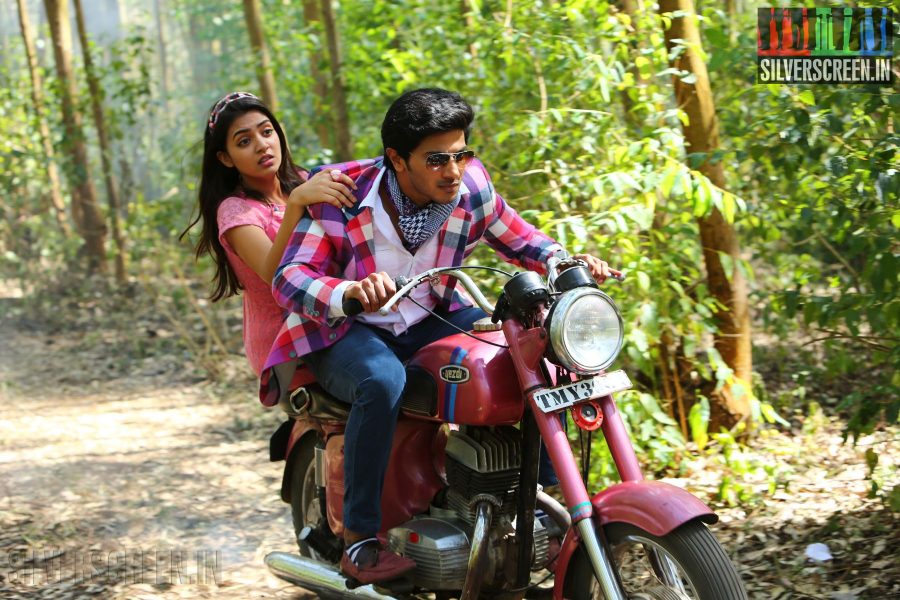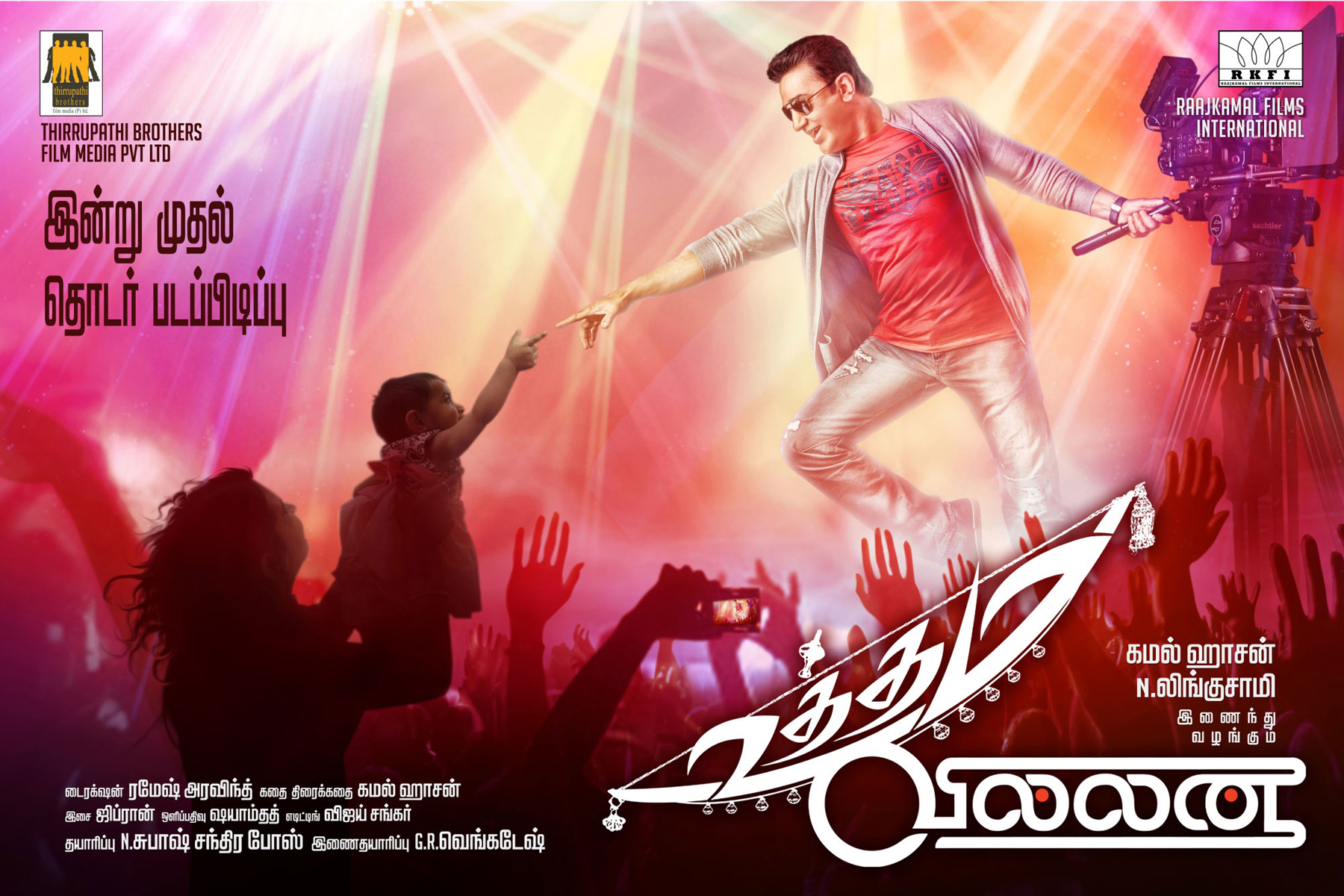Director: Balaji Mohan
Cast: Dulquer Salman, Nazriya Nazim, Madhoo, Pandiarajan
[singlepic id=672 w={320} h={240} float=none]
Vaayai Moodi Pesavum opens with a series of powerful images. A man is on the phone. He speaks in a dull, well-rehearsed drone; he’s evidently trying to secure a business deal. His wife fetches a cup of coffee. He drains it in a gulp, thrusts the empty cup back at her and rushes past wordlessly. But he’s talking alright; being almost courteous; warm even, to a client whom he hasn’t set his eyes on. In yet another moment, a vegetable vendor haggles with his customers. And as only a busy marketplace could, it holds a cacophony of sounds; voices all of them, loud, brash and unrelenting, almost in strange contrast to the deafening silence that the previous scene seemed to exude.
Funnily enough, none of these moments are remarkable. They aren’t essayed brilliantly, no. There’s a wee twinge of pity for the wife; that’s all. She looks forlorn for a moment, but we don’t see the hurt in her eyes. And she’s happily forgotten as the movie rolls by; lost among the milling, faceless mass of humanity grappling with their domestic troubles. She doesn’t stay in our mind for long; her presence is fleeting, and her face fades out of memory. Perhaps, that was the point after all, we think to ourselves; and the reason why we are calling it ‘powerful’ here: not because of the performance, or the dialogue; but the simple and almost effortless recreation of a familiar setting – so much so that the theatre settles into an uneasy silence. And, VMP begins, with a message loud and clear: we don’t talk where we need to; and when we need to.
[quote align=’left’]What we really love about the movie, are those tiny progressive moments that leave us heartened. It’s quite clear on its agenda: just a breezy, light-hearted entertainer with a message that runs deep.[/quote]Vaayai Moodi Pesavum first comes at us as a playful warning mounted atop a triangular road sign: a straight-faced emoticon holding a finger to the lips. It would then be seen along the lanes of a picturesque hillside town called Panimalai (so picturesque that even the Government General Hospital seems like it can be vacationed in); where a strange affliction seems to threaten its residents. There’s the ignorant and corrupt minister, Sundraralingam – Pandiarajan in a hysterical role (the background score whenever he’s on screen is incredible) – and his sly aide. And when he rolls his eyes and gives a guilty squirm to boot, we settle back comfortably. This is the Pandiarajan we know (from Aanpaavam); and have grown up watching. You almost expect him to announce, “muttiruchunga!”and flash a beguiling smile. But he does better. There’s also Madhoo, playing the meek writer-turned-homemaker Vidhya, who vies for her step-daughter Anjana’s (Nazriya) affections.
And then, there’s Dulquer Salman; and his goofy charm. He’s Arvind; or Mr Fix It – a door-to-door sales guy who sells a product that mends broken things. Literally. And also, figuratively. On his first call for the day, he sews a doll’s hand back; and on the second, he mends a fight. On the third, he persuades Vidhya to write again. He can talk his way into anything; and out of anything. And when he clears his throat, followed by a telling ping (a funny recurrence in the movie), we know he’s sealed the deal. He believes ‘talking’ is the antidote to everything.
He lives in a modern-day log cabin, tries to mediate a negotiation between two sides warring over the release of a film (a parody on recent bans); and even throws a challenge to Anjana – an under-utilised Nazriya who plays a young, bespectacled doctor.She, on the other hand, is the antitheses of all that he believes in; introverted and self-conscious, and with irrational adoration for Nuclear Star Bhumesh – the sight of whom is enough to make Arvind shudder visibly – yes he does shudder visibly; hilarious instances of comedy, those. [quote align=’right’]Dulquer Salman couldn’t have chosen a better movie than VMP as his launch vehicle in Tamil[/quote]
But what we really love about the movie, are those tiny progressive moments that leave us heartened, despite the script being firmly entrenched in a web of social dogma. Anjana gets engaged; she’s still unsure about her emotions towards Arvind, but when she does meet him later, she quickly stashes away her ring; and turns to greet him. There’s no melodrama, there’re no tears. She doesn’t want him to know that she’s engaged. Not until she’s ready anyway. She does this every time; until, as is the societal norm, someone comments on her bare finger. And that’s when she places it back. Regretfully. At this juncture, VMP also seems determined to steer clear of clichés. When you expect the altercation between Arvind and the fiancé to turn ugly, it doesn’t. When we think Anjana will come clear on their relationship then, she doesn’t. She instead casts an anguished look at Arvind and rushes after her miffed fiancé.
But Dulquer Salman couldn’t have chosen a better movie than VMP as his launch vehicle in Tamil – due to the simple fact that the script calls for solid-acting; and play-acting. Post intermission, the flick becomes more like a game of dumb-charades, with dialogues few and far in between (here, we do have a gripe. Couldn’t the movie have retained some natural, environmentally-derived sounds instead of a forced BGM during the mimed routines? Couldn’t we at least, for a little while, listen to the gentle rustle of paper as Vidhya writes, or the sleepy, crickety silence of the night?) And in a splendid moment, when Arvind tries to tell Nuclear Star Bhumesh that he’s a big fan of his; with a swift, fluid, flappy hand gesture, all delivered in the course of mundane dialogue, we burst out laughing. You just have to hand it to the guy.
Recommended
VMP also reminds us of another movie from another time, that held its audiences rapt, and which was, once again, essayed by a Malayalam actor. But where Prithiviraj’s Mozhi scored on melodrama, VMP banks on humour; and some endearing quirks. The movie doesn’t take itself too seriously; nor does it force you to. There’s nothing intense about the romance; and there are no strong fits of passion. It’s quite clear on its agenda: just a breezy, light-hearted entertainer with a message that runs deep.
And, in one of the few closing moments, we are re-introduced to the man, and his wife. It’s a different day. The man is on the phone again; and his wife fetches a cup of coffee. He drains it in a gulp, gently places it back in her hands; leans in and whispers, “coffee super”. She smiles. There’s nothing endearing about the comment; nor is it winsome in any way. But she smiles to herself. And, we are left wondering…is that all it takes?



